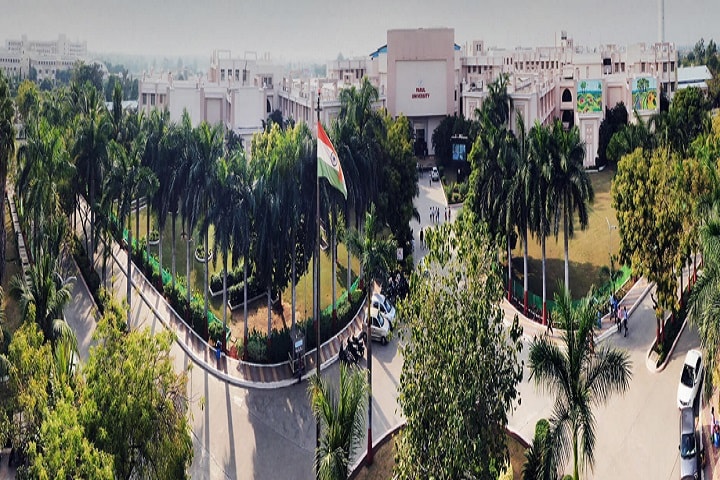
Infrastructure Development Course Details - Fees, Subjects, Syllabus, Duration, Eligibility, Career Scope
Degrees offered: M.E /M.Tech., B.Des, M.Des, M.S
What is Infrastructure Development
An Infrastructure Development course is a specialised educational programme designed to equip students with the necessary skills and knowledge to plan, design, build, and manage various infrastructural projects. These projects include transportation systems, energy systems, water management and waste management, and urban development. The Infrastructure Development course covers a wide range of subjects, such as civil engineering, project management, urban planning, and sustainable development.
The Infrastructure Development course duration generally ranges from one to three years, depending on whether it is a diploma, undergraduate, or postgraduate program. The Infrastructure Development fees vary across institutions and depend on factors such as the type of degree programme, duration, and college ranking.
Numerous Infrastructure Development colleges in India offer a diverse range of courses, including diplomas, Bachelor's, and Master's degrees in Infrastructure Development. Some prestigious institutions offering Infrastructure Development courses in India are the Indian Institutes of Technology (IITs), National Institutes of Technology (NITs), and various state universities and private colleges.
Highlight: Infrastructure Development
Branch Name | Infrastructure Development |
Degree | |
Duration | UG: 4 years PG: 2 years |
Eligibility | UG: 10+2 PG: Bachelor’s degree |
Admission Process | Admission Examination/ Direct Admission |
Top Entrance Exams | JEE Main, JEE Advanced, SNAP, GATE |
Average Course Fees | Rs. 3 lakhs |
Top Colleges | Presidency University, Bangalore, NICMAR Pune, Chandigarh University, UPES Dehradun, RIMT University, Gobindgarh |
Career Options | Civil Engineer, Infrastructure Engineer, Construction Manager, Urban Planner, Architect, Surveyor |
Average Salary | Rs. 5 LPA |
Recruiting Companies | Larsen & Toubro (L&T), Gammon India, Tata Projects, Hindustan Construction Company (HCC), Reliance Infrastructure, Afcons Infrastructure Limited, IL&FS Engineering and Construction Company Limited, Jaypee Group, GMR Group, Essar |
Specialisation or Similar Ones
Infrastructure Development is a broad field that offers various specialisations for students who are interested in pursuing their careers in this field. Here are some key specialisations in an Infrastructure Development course:
Transportation Planning and Engineering
Urban Planning and Management
Water Resources Engineering
Below, we have mentioned some of the major degree programmes in Infrastructure Development and related course:
B.Tech Civil Engineering Specialization in Infrastructure Development | ME Infrastructure Development Part Time |
B.Tech Infrastructure Development and Management Engineering | |
M.Tech Infrastructure Development and Management | MBA Infrastructure Development and Management |
PGDM Transport Infrastructure Development and Financing, Project Management |
Top Infrastructure Development Colleges in India
Infrastructure Development courses are offered by many private universities and colleges. Infrastructure Development fee is mostly based on the degree programme which is chosen by the student, type and location of the college. Some of India's top Infrastructure Development colleges are listed in the table below.
Colleges | Fees |
Rs. 7.61 Lakhs | |
- | |
Rs. 1.29 Lakhs | |
Rs. 1.50 Lakhs | |
- |
Top Private Infrastructure Development Colleges in India
Infrastructure Development courses are offered by a number of private universities and colleges in India. Admission is offered based on previous academic achievements and the results of the entrance examinations. The table below lists some of India's best private Infrastructure Development colleges and Infrastructure Development fees.
Colleges | Fees |
Presidency University, Bangalore | Rs. 7.61 Lakhs |
NICMAR Pune | - |
Chandigarh University | Rs. 1.29 Lakhs |
UPES Dehradun | Rs. 1.50 Lakhs |
RIMT University, Gobindgarh | - |
Eligibility Criteria (UG & PG) of Infrastructure Development
To pursue an Infrastructure Development course in India, the Infrastructure Development eligibility criteria and Infrastructure Development admission process vary depending on the level of the course. For diploma and undergraduate Infrastructure Development degree programmes, candidates must have passed their 10+2 examination with Physics, Chemistry, and Mathematics as compulsory subjects. For postgraduate Infrastructure Development degree programmes, a relevant Bachelor's degree in Civil Engineering, Architecture, or a related field is required.
Eligibility Criteria UG Courses
To pursue a Bachelor's in Infrastructure Development, candidates must have completed their 10+2 with Physics, Chemistry, and Mathematics. Admission to UG courses in Infrastructure Development is usually based on entrance exams like JEE Main, state-level entrance exams, or institute-specific exams.
Students should complete 10+2 with PCM, which comprises Physics, Chemistry and Mathematics as major subjects.
Students must have at least 50 per cent marks to be eligible for the bachelor’s degree programme in Infrastructure Development.
Infrastructure Development admission to the bachelor’s degree programmes depends on direct admission as well as on the entrance examinations.
Top Entrance Exams for UG Courses
JEE Main: JEE Main or Joint Entrance Examination Main is a national level entrance examination for admission to undergraduate engineering courses in NITs, IIITs, and other private and government technical institutions.
JEE Advanced: JEE Advanced or Joint Entrance Examination Advanced is a national-level engineering entrance examination that is conducted by the NTA for admission to various undergraduate engineering courses, in IITs, NITs, and other top engineering colleges in India.
Eligibility Criteria PG Courses
For pursuing a Master's degree in Infrastructure Development, candidates must hold a Bachelor's degree in Infrastructure Development, Civil Engineering, Architecture, or a related field. Admission to postgraduate degree programmes in Infrastructure Development is usually based on entrance exams like GATE, institute-specific exams, or merit-based on the candidate's undergraduate performance.
Students must visit the official website of the entrance exam and fill out the application form.
Students need to pay the registration fee, which varies depending on the examinations.
Students should appear for the entrance examination for admission in the postgraduate Infrastructure Development degree programme.
Top Entrance Exams for PG Courses
GATE: GATE or Graduate Aptitude Test in Engineering is a national level exam that is conducted to test the comprehensive understanding of engineering and science students. GATE scores are accepted by various prestigious colleges and universities across India.
SNAP: SNAP or Symbiosis National Aptitude Test is a university level entrance examination which is conducted by Symbiosis International University for admission in the MBA degree programmes in various colleges like Symbiosis MBA colleges including SIBM Pune, SCMHRD Pune, SIOM Nashik among others.
College Predictors VIEW ALL
Scope of Infrastructure Development in India and Abroad
Infrastructure Development is a rapidly growing field with a huge demand for qualified professionals. The job market scenario of the Infrastructure Development course is very promising, with ample opportunities for graduates. After pursuing an Infrastructure Development course, one can work in various domains, such as construction, transportation, urban planning, environmental management.
The future scope after pursuing an Infrastructure Development course is bright. With India's infrastructure development plans and government initiatives, there is a huge demand for skilled professionals in this field. The job market is expected to grow exponentially, providing ample opportunities for graduates in this field. They can work in various roles such as infrastructure developers, project managers, engineers, architects, consultants.
Students also liked
Course Fees Infrastructure Development
| Minimum Fees | Maximum Fees | |||
|---|---|---|---|---|
| Private | Government | Private | Government | |
| UG | ||||
| PG | ||||
Course Subjects
In this section we have mentioned the syllabus of undergraduate and postgraduate courses of Infrastructure Development specialisation.
Infrastructure Development Syllabus for UG course
Infrastructure Development is a four-year undergraduate programme, and the course syllabus is divided into eight semesters. Below, we have mentioned the topics of the UG syllabus of Infrastructure Development:
Engineering Mathematics | Engineering Mathematics-II |
Building Construction | Mechanics of Solids |
Geotechnical Engineering-I | Geotechnical Engineering-II |
Estimating and Costing | Transportation Engineering-I |
Construction Planning and Management | Design of Masonry Structures |
Building Maintenance and Rehabilitation | Prestressed Concrete Structures |
Construction Equipment | Foundation Engineering |
Project Planning and Control | Remote Sensing and GIS Applications |
Applied Physics | Building Services-II |
Professional Communication | Industrial Training |
Infrastructure Development Syllabus for PG course
Infrastructure Development is a two-year postgraduate programme, and the course syllabus is divided into four semesters. Below, we have mentioned the topics of the UG syllabus of Infrastructure Development:
Research Methodology | Advanced Construction Techniques |
Advanced Materials and Building Technology | Advanced Geotechnical Engineering |
Advanced Transportation Engineering | Research Project |
Advanced Structural Engineering | Advanced Surveying |
Internship | Seminar |
Careers in Infrastructure Development
After completing studies in Infrastructure Development, there are various career opportunities that graduates can pursue. Infrastructure development is a crucial aspect of India's growth and development, and individuals who complete an Infrastructure Development course can pursue various careers in this field. Here are some career options that students can pursue after Infrastructure Development course:
Civil engineers design and oversee the construction of infrastructure projects such as roads, highways, bridges, and buildings. They ensure that the project is safe, environmentally sound, and meets the needs of the community. | |
Infrastructure Engineer | Infrastructure engineers are experts who work with the computing infrastructure of a company. They sometimes also work as civil engineers do, they play a major role in designing, and constructing a building. |
Construction managers plan, budget, and supervise construction projects to ensure that they are completed on time and within budget. They also manage teams of workers and subcontractors. | |
Urban planners develop and implement plans for the use of land and the design of urban spaces. They work with communities, government agencies, and developers to create sustainable and livable communities. | |
Architects design buildings and other structures, including infrastructure systems. They work with clients to determine their needs and develop plans for the project. | |
Surveyor | Surveyors measure and map land, including infrastructure systems. They use specialised equipment to determine boundaries, elevations, and other information needed for construction projects. |
Upcoming trends
Infrastructure Development is an ever-evolving field that is constantly emerging by the influence of various technological advancements and changing industry demands. Below, we mentioned some of the most trending topics in Infrastructure Development from an SEO perspective:
Sustainable infrastructure: With increasing concerns about climate change and environmental impact, sustainable infrastructure development has become a major trend in recent years. This involves designing, constructing and managing infrastructure in a way that minimises environmental damage and reduces carbon emissions.
Smart infrastructure: The use of technology and data to optimise infrastructure performance is another trend in infrastructure development. Smart infrastructure includes things like connected roads, intelligent transportation systems and smart buildings.
Resilient infrastructure: With the increasing frequency and severity of natural disasters, building resilient infrastructure that can withstand and recover from these events has become a priority. This includes things like flood-resistant buildings, earthquake-resistant bridges and disaster-proof power grids.
Infrastructure as a service: The rise of cloud computing and virtualization has led to the emergence of infrastructure as a service (IaaS) as a popular model for delivering IT infrastructure. This involves outsourcing the management of infrastructure to a third-party provider who can deliver it over the internet.
Public-private partnerships: Infrastructure development often involves large-scale projects that require significant investment. Public-private partnerships (PPPs) have become a popular way to finance these projects, with governments and private companies working together to share the costs and risks.
Job Profiles and Top Recruiters
Infrastructure Development graduates can be employed in various organisations, including government sectors, public and private sector companies, construction firms, and research institutes. Some of the top recruiters for students who have completed their Infrastructure Development course are:
Larsen & Toubro (L&T)
Gammon India
Tata Projects
Hindustan Construction Company (HCC)
Reliance Infrastructure
Afcons Infrastructure Limited
IL&FS Engineering and Construction Company Limited
Jaypee Group
GMR Group
Essar
Average Salary
In the table below, we have mentioned the average salary of the Infrastructure Development graduates:
Job profiles | Average salary |
Civil Engineer | Rs. 5 LPA |
Infrastructure Engineer | Rs. 7 LPA |
Construction Manager | Rs. 9 LPA |
Urban Planner | Rs. 6 LPA |
Architect | Rs. 5 LPA |
Surveyor | Rs. 3.5 LPA |
Note: These salary figures may vary depending on various factors, such as designation, experience, skills, job location.
Required Skillset for Infrastructure Development
To excel in an Infrastructure Development course, a combination of soft skills and technical skills is essential. These soft skills and technical skills will not only help students succeed academically but also prepare them for a rewarding career in the particular field.
Analytical skills | Communication skills |
Problem-solving skills | Leadership skills |
Technical Skills | Ability to visualise |
Course Curriculum for Infrastructure Development
The Infrastructure Development course curriculum covers a range of topics and sub-topics relevant to the field of Construction Contracts and Specifications, Disaster Mitigation and Management, Project Management for Infrastructure Development, Infrastructure Planning and Development, Sustainable Development. Below we have mentioned the major Infrastructure Development course curriculum.
Engineering principles: Engineering principles include topics like structural engineering, civil engineering, electrical engineering and mechanical engineering.
Construction methods: Construction methods cover the various methods and techniques used in construction, including materials selection, project planning and scheduling, and construction safety.
Project management: Project management covers the principles of project management, including project planning, risk management, quality control and team management.
Infrastructure Development: Infrastructure Development covers the various financing models used in infrastructure development, including public-private partnerships, project finance and government funding.
Environmental impact: Environmental impact covers the impact of infrastructure development on the environment, including topics like sustainability, green infrastructure and environmental regulations.
Popular Infrastructure Development Entrance Exams in India
IELTS
Exam Date: 22 Feb, 2025
Popular Infrastructure Development Colleges in India VIEW ALL
Frequently Asked Questions (FAQs)
Question: What are the top recruiting companies that hire Infrastructure Development students?
Answer :
The top recruiting companies that hire Infrastructure Development students are Larsen & Toubro (L&T), Gammon India, Tata Projects, Hindustan Construction Company (HCC), Reliance Infrastructure, Afcons Infrastructure Limited, IL&FS Engineering and Construction Company Limited, Jaypee Group, GMR Group, Essar.
Question: What are the top career choices for the Infrastructure Development students?
Answer :
The top career choices for the Infrastructure Development students are Civil Engineer, Infrastructure Engineer, Construction Manager, Urban Planner, Architect, Surveyor.
Question: What are the skills required for an Infrastructure Development course?
Answer :
The skills required for an Infrastructure Development course are Analytical skills, Communication skills, Problem-solving skills, Leadership skills, Technical Skills, Ability to visualise.
Question: What are the entrance exams required for Infrastructure Development?
Answer :
The entrance exams required for Infrastructure Development are JEE Main, JEE Advanced, SNAP, GATE.
Question: What are the specialisation of Infrastructure Development courses?
Answer :
Some of the specialisations of Infrastructure Development courses are Transportation Planning and Engineering, Urban Planning and Management, Structural Engineering, Water Resources Engineering, Geotechnical Engineering.
Question: What are the benefits of pursuing an Infrastructure Development course?
Answer :
Infrastructure development is a growing field with high demand for skilled professionals, offering a range of career opportunities in areas like engineering, construction management, and project finance.
Question: What do you study in an Infrastructure Development Course?
Answer :
An Infrastructure Development course typically covers topics such as engineering principles, construction methods, project management, infrastructure finance, and environmental impact. Students learn about the different types of infrastructure, how to plan and design infrastructure projects, how to manage construction, and how to ensure that projects are delivered on time and within budget.
Question: Is Infrastructure Development difficult?
Answer :
Infrastructure Development can be challenging due to the complexity and scale of the projects involved. It requires a multidisciplinary approach that involves collaboration between engineers, architects, construction workers, and project managers. Additionally, infrastructure projects often involve navigating complex regulatory frameworks, managing large budgets, and addressing environmental and social concerns.
Question: What are some examples of Infrastructure Development?
Answer :
Examples of Infrastructure Development include: Transportation infrastructure, Energy infrastructure, Water infrastructure, Communication infrastructure, Social infrastructure.
Question: What is the purpose of Infrastructure Development?
Answer :
The purpose of Infrastructure Development is to design, build, and maintain physical and digital structures that support and improve the functioning of societies. Infrastructure includes everything from transportation systems like roads and airports, to energy systems like power grids and pipelines, to communication systems like broadband networks and data centres. The ultimate goal of infrastructure development is to provide people with access to essential services, improve economic growth, and promote social well-being.















